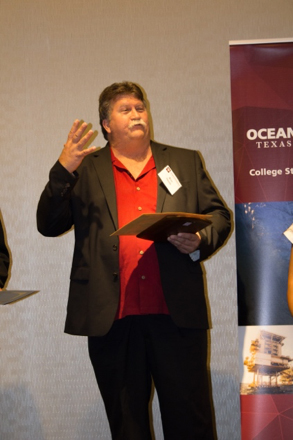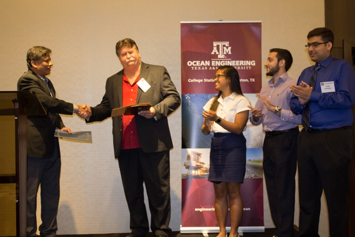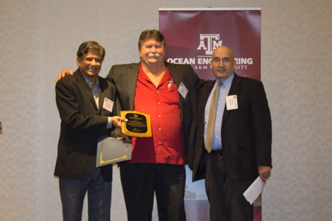Following a dream to build and install underwater habitats, Ron Smith found the key to his dream in by earning a degree in ocean engineering from Texas A&M University.
“I told my mom that I wanted to be an oceanographer that knew how to build structures underwater,” said Smith, founder of Deep Down, Inc. and advisory board member in the Department of Ocean Engineering. “This was in 1975 when I was a junior in high school. She presented Texas A&M’s ocean engineering program to me and I knew instantly this is what I wanted to do, but I didn’t want my parents to have to pay for my education when I had that covered from the Naval Academy.”
 Upon graduation, Smith began working as a drilling engineer trainee at ODECO in New Orleans. He was one of the first to have the Unlimited Master Modular Offshore Drilling Units (MODU) Marine license, so he managed the semi-submersible MODUs. While there, he learned from a mentor, Lee Trahan, that work success is based on 20 percent ability and 80 percent working well with others.
Upon graduation, Smith began working as a drilling engineer trainee at ODECO in New Orleans. He was one of the first to have the Unlimited Master Modular Offshore Drilling Units (MODU) Marine license, so he managed the semi-submersible MODUs. While there, he learned from a mentor, Lee Trahan, that work success is based on 20 percent ability and 80 percent working well with others.
“I worked seven or 14 days offshore and in my off-time, I either worked in the office five days a week or went to training schools that a few of us in the same program set up,” Smith said. “It was a self-training program. I learned to balance my ocean engineering education with real field experience and found that spot right in the middle, which shaped my career.”
Trahan was just one of many mentors Smith learned from in his life that deeply influenced who he has become and what he is committed to in his work and personal life.
“My dad was a retired Marine Corps major and highly-decorated F4U corsair fighter pilot,” Smith said. “He was also my baseball coach, scout master, hunting and fishing teacher. Anything I wanted to do, he was grown up doing everything with me and teaching me lessons without me knowing I was being taught. When I got to high school and he asked about my day, I told him what all we did not have. He got himself on the school board and organized a bond election as he was a stock broker.”
As a school board member, Smith’s dad cleaned up the school and obtained all the chemistry, physics, athletic and art equipment students could possibly need.
“He followed me every step of the way and made sure I had all the support I needed, no matter what the topic,” Smith said.
Then Smith went to Texas A&M and met another key mentor.
 “Dr. Robert Randall made me feel important no matter what my grades were and found the spot for each person, teaching us to be all we could be from a fun, educational and career-building way,” Smith said.
“Dr. Robert Randall made me feel important no matter what my grades were and found the spot for each person, teaching us to be all we could be from a fun, educational and career-building way,” Smith said.
In 1997, he decided to embark on a journey of his own to provide save-the-day products and services to oil companies. Deep Down, Inc. was founded and has since supported companies on some of the most important field developments in the world and some of the most critical catastrophes.
“It was mine and Patrice Chemin’s, president of Stolt Comex Seaway, effort to talk our respective bosses into forming an alliance between Kvaerner and Stolt Comex Seaway to provide turnkey supply and installation of our steel tube umbilical’s,” Smith said. “Shell decided to form a frame agreement on who would supply all their complete subsea systems and FMC Technologies was awarded the contract.”
Shortly afterwards, Shell consolidated the controls into FMC and agreed to start using Kongsberg controls, an FMC owned company, with FMC and shift to an all-inclusive frame agreement of FMC supply. Shell could no longer support Smith’s company from Kvaerner FSSL as they were competitors to FMC.
“While discussing my predicament with Patrice, he told me, ‘Ron, deep down you’ll never be truly happy until you have your own company. Hey you should call it deep down,’” Smith said. “So I took his advice and formed Deep Down, Inc. in the following days.”
What was once one person and then one specialized team on the deck of the vessel is now a team of about 100 people with a concentrated effort to keep it lean and mean in order to maintain all the expectations set out.
“Our client at BP once said, ‘DDI is a small company that does big things,’ which is something close to my heart,” Smith said. “We now have all the systems in place to either maintain this 100-person level with all the safety and quality that goes with it or increase to two or three times the size providing exponentially more to our clients and still maintain our core values and skill sets.”
Today his job description goes beyond ocean engineering, and includes words such as influencer, professional mentor and role model. Smith is a platinum level sponsor of the Aggie Ocean Discovery XPRIZE student team that has now reached the finalist level of the international Shell Ocean Discovery XPRIZE competition.
“It meant a lot to be there for the faculty and the students to share how their education and my experience has been a good blend to help both the professors in their teaching and the students in their learning,” Smith said. “My niche is promoting that balance I keep talking about. Also, by opening my shop and team to the students in an internship makes me proud to see our influence start to take roots and see the students grow in front of our very eyes. I want to continue to do this.”
 Smith was named the inaugural Department of Ocean Engineering Outstanding Alumni last fall in recognition of his work and support of the department.
Smith was named the inaugural Department of Ocean Engineering Outstanding Alumni last fall in recognition of his work and support of the department.
Smith credits his teaching and mentoring style to another mentor of his own, Captain Peter Bamber, a marine superintendent from his days at ODECO.
“He was a British sea captain in the British and Cajun Navy’s in which education was focused on academic growth and internships as they did in the United Kingdom,” Smith said. “He pushed me to develop the skillsets to solve the offshore problems and find the best balance of education and experience. I think this is where I get much of my training aptitude and desire to have interns like the XPRIZE team in my company. I want to give back.”
Smith encourages new graduates to take the time to learn from those who have been in the industry for a while as he did.
“Respect those old guys in the field and learn from them by listening and working with them,” Smith said. “Get as much offshore experience as possible and blend it with the education and find your own balance, whether it is most education with a little experience, or most experience with a little education or smack down the middle.”